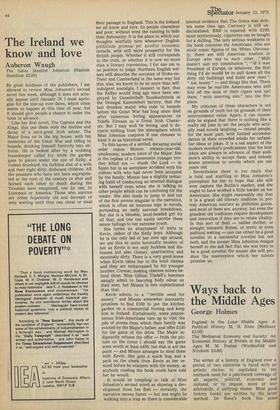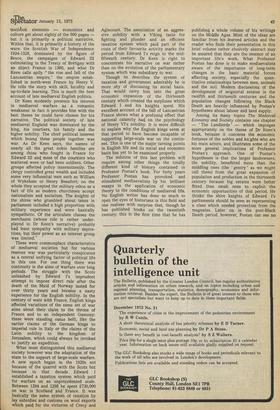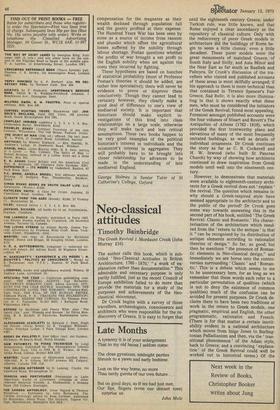Ways back to the Middle Ages
George Holmes
England in the Later Middle Ages: A Political History M. H. Keen (Methuen £3.95) The Mediaeval Economy and Society: An Economic History of Britain in the Middle Ages M. M. Postan (Weidenfeld and Nicolson £3.00) The writer of a history of England over a period of two centuries is faced with an artistic choice: to capitulate to the textbook need for a patchwork coverage of all aspects, political, economic and cultural, or to impose, more or less arbitrarily, a unifying theme. Most good history books are written by the latter method. Dr Keen's book has some textbbok elements — economics and culture get about eighty of the 500 pages — but it is primarily a political narrative.
Within that, it is primarily a history of the wars: the Scottish War of Independence 1924-1328, dominated by the figure of Bruce, the campaigns of Edward III culminating in the Treaty of Bretigny with an abject France in 1360, and what Dr Keen calls aptly "the rise and fall of the Lancastrian empire," the empire estab lished in north-west France by Henry V. He tells the story with skill, lucidity and up-to-date learning. This is much the best account of late mediaeval English politics.
Dr Keen modestly presents his interest in mediaeval warfare as a romantic weakness: in fact it provides him with the best theme he could have chosen for his narrative. The political society of late mediaeval England was dominated by the king, his courtiers, his family and the higher nobility. The chief political interest which bound these people together was war. As Dr Keen says, the names of nearly all the great noble families are among those who fought in France for Edward III and most of the courtiers who mattered were or had been soldiers. Other groups affected policy intermittently. The clergy controlled great wealth and included some very influential men such as William of Wykeham or Henry Beaufort; on the whole they accepted the military ethos as a fact of life as modern churchmen accept nationalism and socialism. The knights of the shires who grumbled about taxes in parliament included a high proportion with military experience and were basically sympathetic. Of the articulate classes the merchants (whose role is rather underplayed in Dr Keen's narrative) probably had least sympathy with military aspirations, but their power as an interest group was limited..
These were commonplace characteristics of mediaeval societies but for various reasons war was particularly conspicuous as a central unifying factor of political life in this one. For one thing there was continuity in the aims of warfare over long periods. The struggle with the Scots unleashed by Edward I's imprudent attempt to impose direct rule after the death of the Maid of Norway lasted for over thirty years and became a nasty experience for the English nobility. In the century of wars with France, English kings affected variations of the same set of war aims about their claim to the throne of France and to an independent Gascony: these were standing casus bent, like the earlier claims of the German kings to imperial rule in Italy or the claims of the Latin nobility to the kingdom of Jerusalem, which could always be invoked to justify an expedition.
What most distinguished this mediaeval society however was the adaptation of the state to the support of large-scale warfare.
A new epoch began in the 1920s not because of the quarrel with the Scots but because in that decade Edward I established a taxation system which paid for warfare on an unprecedented scale.
Between 1294 and 1298 he spent £730,000 on war in Scotland and France. It was basically the same system of taxation by lay subsidies and customs on wool exports which paid for the victories of Crecy and Agincourt. The association of an aggressive nobility with a Viking taste for fighting and plunder and an efficient taxation system which paid part of the costs of their favourite activity marks the period from Edward I's reign to the midfifteenth century. Dr Keen is right to concentrate his narrative on war rather than on the evolution of the parliamentary system which was subsidiary to war.
Though he describes the system of taxation and government admirably he is more shy of discussing its social basis.
That would carry him into the great economic expansion of the thirteenth century which created the surpluses which Edward I and his knights spent. His excellent account of the fall of Lancastrian France shows what a profound effect that national calamity had on the psychology of Henry VI's nobility. It is more difficult to explain why the English kings seem at that period to have become incapable of supporting large-scale war on the continent. This is one of the major turning points in English life and its social and economic basis has yet to be examined properly.
The solution of this last problem will require among other things the totally different kind of history contained in Professor Postan's book. For forty years Professor Postan has provoked and stimulated mediaevalists by his brilliant essays in the application of economic theory to the conditions of mediaeval life. No English writer has done so much to open the eyes of historians in this field and one realises with surprise that, though he has published books on the twentieth century, this is the first time that he has published a whole volume of his writings on the Middle Ages. Most of the ideas are familiar from his .learned articles and the reader who finds their presentation in this brief volume rather elusively abstract may be assured that they are the essence of an important life's work. What Professor Postan has done is to make mediaevalists aware of the importance of long-term changes in the basic material forces affecting society, especially the quantitative relationships between men, animals and the soil. Modern discussions of the development of seignorial estates in the twelfth and thirteenth centuries and the population changes following the Black Death are heavily influenced by Postan's hypotheses about labour and land supply.
Among its many topics The Medieval Economy and Society contains one chapter — 'The Landlords' — which impinges appropriately on the theme of Dr Keen's book, because it concerns the economic fortunes of the nobles and kn:ghts who are his main actors, and illustrates some of the more general implications of Professor Postan's approach. One of Postan's hypotheses is that the larger landowners, the nobility, benefitted more than the middling ones (the ' gentry ' as we might call them) from the great expansion of population and production in the thirteenth century because big estates were better fitted than small ones to exploit the economic opportunities of that period. He thinks the shire knights of Edward I's parliaments should be seen as representing a class which needed protection from the magnates. Later on in the post-Black Death period, however, Postan can see no compensation for the magnates as their wealth declined through population fall and the gentry profited at their expense.
The Hundred Years War has been seen by some as a source of income from ransom and plunder which offset the agricultural losses suffered by the nobility through labour shortage. Postan questions whether the profits of war brought a net profit to the English nobility when set against the costs they incurred by fighting.
These hypotheses are based on hunches of statistical probability (most of Professor Postan's theories it should be added, are rather less speculative); there will never be evidence to prove or disprove them conclusively. Though they cannot lead to certainty however, they clearly make a good deal of difference to one's view of mediaeval society. It is important that historians should make explicit investigations of this kind into class relationships on a large scale, otherwise they will make tacit and less critical assumptions. These two books happen to be very good examples of the political historian's interest in individuals and the economist's interest in aggregates. They will probably have to be brought into closer relationship for advances to be made in the understanding of late mediaeval England.
George Holmes is Senior Tutor of St Catherine's College, Oxford




































 Previous page
Previous page